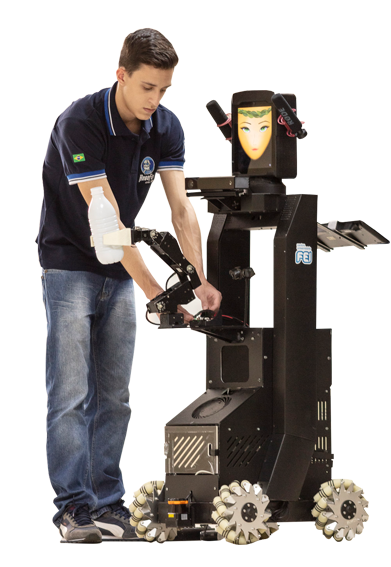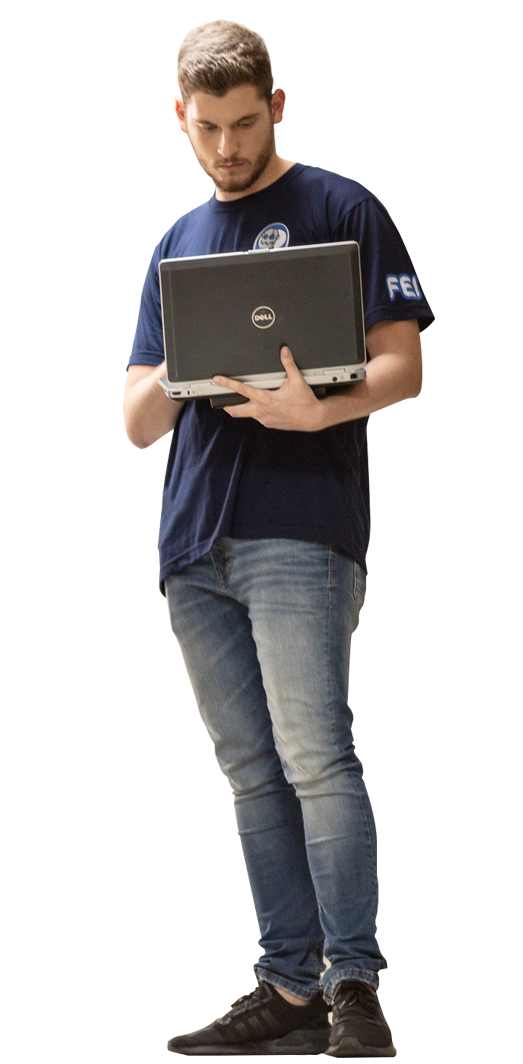October, 19th to 21st, 2022
Workshop de Teses e Dissertações em Robótica (WTDR) e Concurso de Teses e Dissertações em Robótica (CTDR)


WTDR 2022 is part of LARS/SBR 2022, which will be held on October 19-21, 2022 . WTDR provides an opportunity for PhD and MSc students in Brazil to present their ongoing and/or recently concluded research with a panel of established researchers in Robotics.The workshop aims to:
Provide a setting for mutual feedback on participants’ current research and guidance on future research directions; Develop a supportive community of scholars and a spirit of collaborative research; Contribute to the conference goals through interaction of graduate students with other researchers as well as participation in conference events; Increase the visibility of ongoing work for the academic and industrial community.
CTDR 2022 will take place in parallel to WTDR 2022. The main goals of CTDR are to divulge and award the best academic work in Robotics concluded in Brazilian Universities from October, 2020 to September, 2022 (works that have already participated in past events will not be able to compete again). CTDR expects papers with concluded work, with evaluation and results. Selected works will be presented and judged during ROBOTICA 2022 (it is intended to have a hybrid event, with in-person or virtual presentations). Notice that in the submission phase, the main object of judgment is the paper; while during the conference, the main object of judgment is the full thesis or dissertation (that is submitted along with the paper).
Important Note: Papers submitted to CTDR and WTDR should differ from other publications of the author, this includes submissions to LARS 2022. Please make sure that your paper is not a copy/partial copy of your previously published work, thus avoiding auto-plagiarism issues.
WTDR/CTDR welcome research work in Robotics topics. They include but are not limited to:
- Vision in robotics and automation
- Symbol mediated robot behavior control
- Sensory mediated robot behavior control
- Active sensory processing and control
- Industrial applications of autonomous systems
- Sensor modeling and data interpretation (e.g. Models and software for sensor data integration, 3D scene analysis, environment description and modeling, pattern recognition)
- Robust techniques in AI and sensing (e.g. Uncertainty modeling, graceful degradation of systems)
- Robot programming
- Multi-robot and multi-agents, cooperation and collaboration
- CAD-based robotics (e.g. CAD-based vision, reverse engineering)
- Robot simulation and visualization tools
- Tele-autonomous systems
- Micro-electromechanical robots
- Robot control architectures
- Robot planning, communication, adaptation and learning
- Mechanical design
- Robot soccer
- Evolutionary robotics
- Robots for robotic surgery and rehabilitation
- Micro/nano robotics, new devices and materials for robots
- Micro/nano robotics, new devices and materials for robots
- Recognition and synthesis of voice and natural language generation
- Education issues in robotics
- Computing architectures
- Sensor networks, architectures of embedded hardware and software
- Self-localization, mapping and navigation
- Aerial vehicles
- Mobile robot platforms
- Underwater robots
- Manuscript submission: August 15th, 2022 (Extended)
- Notification of Acceptance: September, 16th, 2022
- Camera Ready Submission: September 30th, 2022
- Conference date: October 19th to 21th, 2022
Papers can be written in English or in Portuguese and must not exceed 10 pages (WTDR) and 12 pages (CTDR), including title, abstract, all tables, figures, and references. Authors should use the style file of SBC. More detailed information can be found at: SBC Template
We expect submission of papers to WTDR with research purposes and appropriate motivation, literature review, and methods. Results (preliminary, at least) are desirable, but not necessary. Submission to CTDR expects papers with concluded work, with evaluation and results.
Papers should include the following information in the first page after the abstract: student level (MSc or PhD) and expected date of conclusion or the date of conclusion (CTDR). In addition, include the name of the advisor (and co-advisors) as co-authors. Articles must have abstract and keywords (if written in Portuguese, abstract and keywords in English and, also, in Portuguese).
Submissions violating the formatting guidelines will be excluded from the reviewing process. Only papers in pdf format will be accepted.
Papers must be submitted using the JEMS system: https://jems.sbc.org.br/
The five best papers submitted to the CTDR on each category (M.Sc. and Phd) will be presented at the CTDR while the remaining will be presented together with the accepted WTDR papers. All WTDR and CTDR papers will be published in online proceedings, with DOI and ISBN, at SOL - SBC
As additional motivation, at least one of the top three works/authors from the CTDR will be awarded with an invitation to publish in the Journal of Intelligent & Robotic Systems - JINT
At least one author of each accepted paper must be registered and attend the conference to present the work. We recommend that the students present their works, as the events may be a valuable experience for them.
Accepted papers for the MSc / PhD Contest in Robotics (CTDR):
| Title | Track | Authors |
|---|---|---|
| Exteroceptive Modeling Via Cliffords Algebra for Confined Environment Trajectory of the Movemaster RV-M2 Robot | CTDR - MSc |
Jonathan Cerbaro Andre Schneider de Oliveira João Fabro |
| Path Planning Algorithms in Unknown and Unstructured Environments for UAVs | CTDR - MSc | Lidia Rocha Kelen Vivaldini |
| Controlador desacoplado livre de modelo para caminhada de robôs humanoides | CTDR - MSc | Maria Tejada-Begazo Esther Colombini Alexandre Simões |
| Odometria Multifrequência para Veículos Aéreos Autônomos | CTDR - MSc | Patrick Ferreira Esther Colombini |
| Aprendizado procedimental e sensório-motor em robôs cognitivos | CTDR - MSc | Leonardo Rossi Letícia Berto Eric Rohmer Paula Dornhofer Paro Costa Ricardo Gudwin Esther Colombini Alexandre Simões |
| Learning by Demonstration of Coordinated Plans in Multiagent Systems | CTDR - PhD | Marco Antonio Simões Tatiane Nogueira |
| Um Método para Localização de Veículos Subaquáticos Baseado em Imagens Visíveis Aéreas e Acústicas Subaquáticas | CTDR - PhD | Matheus Machado dos Santos Paulo Lilles Drews Jr Silvia Botelho |
| Decisão Consensual em Sistemas Multirrobôs | CTDR - PhD | Vivian Cremer Kalempa Andre Schneider de Oliveira |
| Terrain-Aware Autonomous Exploration of Unstructured Confined Spaces | CTDR - PhD | Héctor Azpúrua Mario Fernando Campos Douglas Guimarães Macharet |
| Mapeamento e Localização Simultâneos em Ambientes Dinâmicos usando Detecção de Pessoas | CTDR - PhD | Joao Soares Marcelo Gattass Marco Meggiolaro |
Accepted papers for the Workshop (WTDR) (these tracks were changed from CTDR to WTDR):
| Title | Track | Authors |
|---|---|---|
| Sistema adaptativo para teleoperação de uma base móvel através de reconhecimento gestual | WTDR |
Dieisson Martinelli, Andre Schneider de Oliveira, João Fabro |
| Human Interactions in Semi-Autonomous Systems of Remotely Piloted Aircraft | WTDR | Richard Miranda, Edison Ishikawa |
| Study on the comfort of people in spatial interactions with a social robot | WTDR | Fagner de Assis Moura Pimentel |
| Comportamento Coletivo e Bioinspirado para Sistemas Multirrobô | WTDR | Ronnier Rohrich, Andre Schneider de Oliveira, José Lima |







